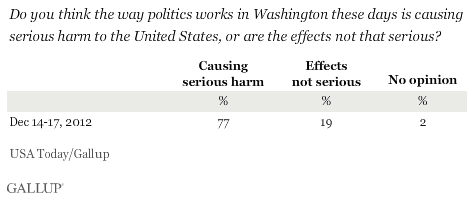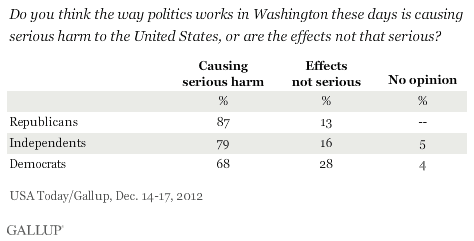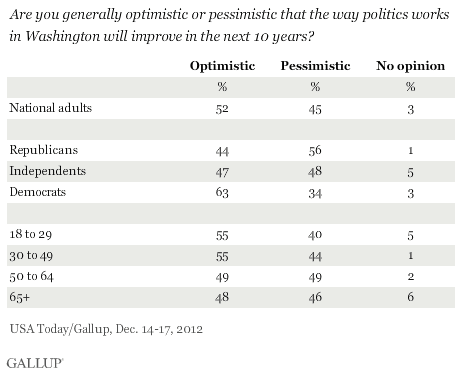PRINCETON, NJ -- More than three-quarters of Americans (77%) say the way politics works in Washington these days is causing serious harm to the United States, providing still another indicator of the low esteem in which Americans hold their elected officials and the way the federal government works.

These results are from a Dec. 14-17 USA Today/Gallup poll, conducted in the middle of stalled negotiations between Congress and the president on the issue of averting the looming fiscal cliff. Americans were split in their opinions of the agreement ultimately reached at the end of the year, with more negative than positive approval ratings for the way the various leaders involved handled it.
The finding that most Americans think politics are hurting the country fits with a number of additional measures showing that Americans hold the federal government in general and Congress in particular -- the main instruments of how American politics work -- in low regard. The 19% of Americans who do not feel negatively about the way politics are being handled is quite close to Congress' current 18% job approval rating. Confidence in Congress as an institution -- the percentage with a great deal or quite a lot of confidence in it -- is at 13%, and 10% and 14% of Americans rate the honesty and ethics of members of Congress and senators, respectively, as high or very high. Also, last August, 23% of Americans gave the "federal government" a positive rating, while 14% rated it neutrally, and 60% gave it a negative rating.
Despite these low ratings of the federal government and Congress, Americans are somewhat more positive about the presidency. Obama's job approval rating has been above 50% in recent weeks, and confidence in the presidency in general was 37% in Gallup's June update. Thus, the American public's negative views of the impact of politics appear to be aimed more at Congress and government generally than at the executive branch.
GOP, Democrats, Independents Agree That Washington Politics Are Harmful
A majority of all partisan groups express negative sentiments about the harmful impact of politics in Washington. Republicans are, however, modestly more negative than either independents or Democrats.

Americans More Optimistic Than Pessimistic About the Future
Americans are more likely to express optimism than pessimism when asked about the future of the way Washington politics work. Fifty-two percent say they are optimistic that the way politics work in Washington will improve in the next 10 years; 45% are pessimistic.
Democrats are significantly more likely to be optimistic than are Republicans, perhaps because a Democratic president is currently in the White House. Younger Americans are slightly more positive than older Americans.

Bottom Line
It is not surprising that most Americans believe the way politics work today in the nation's capital is causing serious harm to the country -- given numerous indicators from prior research showing the negative image Americans have of their elected officials and the federal government in general. A little more surprising, perhaps, is the finding that more than half of Americans believe that things will get better in the coming decade.
Survey Methods
Results for this USA Today/Gallup poll are based on telephone interviews conducted Dec. 14-17, 2012, with a random sample of 1,025 adults, aged 18 and older, living in all 50 U.S. states and the District of Columbia.
For results based on the total sample of national adults, one can say with 95% confidence that the maximum margin of sampling error is ±4 percentage points.
Interviews are conducted with respondents on landline telephones and cellular phones, with interviews conducted in Spanish for respondents who are primarily Spanish-speaking. Each sample includes a minimum quota of 400 cellphone respondents and 600 landline respondents per 1,000 national adults, with additional minimum quotas among landline respondents by region. Landline telephone numbers are chosen at random among listed telephone numbers. Cellphone numbers are selected using random-digit-dial methods. Landline respondents are chosen at random within each household on the basis of which member had the most recent birthday.
Samples are weighted by gender, age, race, Hispanic ethnicity, education, region, adults in the household, population density, and phone status (cellphone only/landline only/both, cellphone mostly, and having an unlisted landline number). Demographic weighting targets are based on the March 2011 Current Population Survey figures for the aged 18 and older U.S. population. All reported margins of sampling error include the computed design effects for weighting.
In addition to sampling error, question wording and practical difficulties in conducting surveys can introduce error or bias into the findings of public opinion polls.
View methodology, full question results, and trend data.
For more details on Gallup's polling methodology, visit www.gallup.com.
